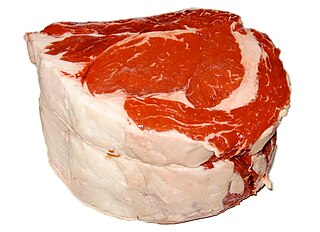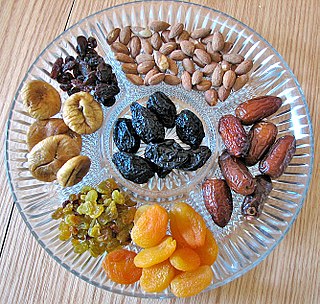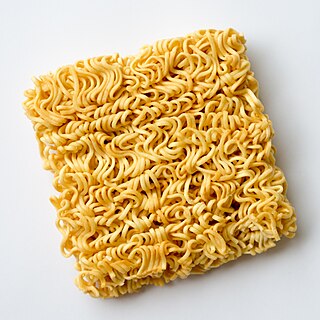
Beef is the culinary name for meat from cattle. Beef can be prepared in various ways; cuts are often used for steak, which can be cooked to varying degrees of doneness, while trimmings are often ground or minced, as found in most hamburgers. Beef contains protein, iron, and vitamin B12. Along with other kinds of red meat, high consumption is associated with an increased risk of colorectal cancer and coronary heart disease, especially when processed. Beef has a high environmental impact, being a primary driver of deforestation with the highest greenhouse gas emissions of any agricultural product.

Yogurt is a food produced by bacterial fermentation of milk. The bacteria used to make yogurt are known as yogurt cultures. Fermentation of sugars in the milk by these bacteria produces lactic acid, which acts on milk protein to give yogurt its texture and characteristic tart flavor. Cow's milk is the milk most commonly used to make yogurt. Milk from water buffalo, goats, ewes, mares, camels, and yaks are also used to produce yogurt. The milk used may be homogenized or not. It may be pasteurized or raw. Each type of milk produces substantially different results.

Margarine is a spread used for flavoring, baking, and cooking. It is most often used as a substitute for butter. Although originally made from animal fats, most margarine consumed today is made from vegetable oil. The spread was originally named oleomargarine from Latin for oleum and Greek margarite. The name was later shortened to margarine.
A health claim on a food label and in food marketing is a claim by a manufacturer of food products that their food will reduce the risk of developing a disease or condition. For example, it is claimed by the manufacturers of oat cereals that oat bran can reduce cholesterol, which will lower the chances of developing serious heart conditions. Vague health claims include that the food inside is "healthy," "organic," "low fat," "non-GMO," "no sugar added," or "natural".
In the U.S. and Canada, the Reference Daily Intake (RDI) is used in nutrition labeling on food and dietary supplement products to indicate the daily intake level of a nutrient that is considered to be sufficient to meet the requirements of 97–98% of healthy individuals in every demographic in the United States. While developed for the US population, it has been adopted by other countries, though not universally.

Sprouting is the natural process by which seeds or spores germinate and put out shoots, and already established plants produce new leaves or buds, or other structures experience further growth.

Bottled water is drinking water packaged in plastic or glass water bottles. Bottled water may be carbonated or not. Sizes range from small single serving bottles to large carboys for water coolers.

Geraint Richard Davies is a British politician who has been the Member of Parliament (MP) for Swansea West since 2010. He was elected as a member of the Labour Party, but was suspended from the party in 2023 and now sits as an independent. Previously, Davies was the Labour MP for Croydon Central from 1997 to 2005. He had also served as the Leader of Croydon London Borough Council.

Mechanically separated meat (MSM), mechanically recovered/reclaimed meat (MRM), or mechanically deboned meat (MDM) is a paste-like meat product produced by forcing pureed or ground beef, pork, mutton, turkey or chicken, under high pressure through a sieve or similar device to separate the bone from the edible meat tissue. It is sometimes called white slime as an analog to meat-additive pink slime and to meat extracted by advanced meat recovery systems, both of which are different processes. The process entails pureeing or grinding the carcass left after the manual removal of meat from the bones and then forcing the slurry through a sieve under pressure. This puree includes bone, bone marrow, skin, nerves, blood vessels, and the scraps of meat remaining on the bones.

Dried fruit is fruit from which the majority of the original water content has been removed either naturally, through sun drying, or through the use of specialized dryers or dehydrators. Dried fruit has a long tradition of use dating back to the fourth millennium BC in Mesopotamia, and is prized because of its sweet taste, nutritive value, and long shelf life.

Raw milk or unpasteurized milk is milk that has not been pasteurized, a process of heating liquid foods to kill pathogens for safe consumption and extending the shelf life.
Although health benefits have been assumed throughout the history of using Camellia sinensis as a common beverage, there is no high-quality evidence that consuming tea confers significant benefits other than possibly increasing alertness, an effect caused by caffeine in the tea leaves. In clinical research conducted over the early 21st century, tea has been studied extensively for its potential to lower the risk of human diseases, but there is no good scientific evidence to indicate that consuming tea affects any disease or improves health.

Cranberry juice is the liquid juice of the cranberry – a fruit recognized for its bright red color, tart taste, and versatility for product manufacturing. Major cranberry products include cranberry juice, dried cranberry, cranberry sauce, frozen cranberry, cranberry powder, and dietary supplements containing cranberry extracts.
Fluid balance is an aspect of the homeostasis of organisms in which the amount of water in the organism needs to be controlled, via osmoregulation and behavior, such that the concentrations of electrolytes in the various body fluids are kept within healthy ranges. The core principle of fluid balance is that the amount of water lost from the body must equal the amount of water taken in; for example, in humans, the output must equal the input. Euvolemia is the state of normal body fluid volume, including blood volume, interstitial fluid volume, and intracellular fluid volume; hypovolemia and hypervolemia are imbalances. Water is necessary for all life on Earth. Humans can survive for 4 to 6 weeks without food but only for a few days without water.

Hydroxytyrosol is an organic compound with the formula (HO)2C6H3CH2CH2OH. It is a phenylethanoid, i.e. a relative of phenethyl alcohol. Its derivatives are found in a variety of natural sources, notably olive oils and wines. Hydroxytyrosol is a colorless solid, although samples often turn beige during storage. It is a derivative, formally speaking, of catechol.
The "jelly bean rule" is a rule put forth by the U.S. Food and Drug Administration (FDA) on May 19, 1994.

The presence of mercury in fish is a health concern for people who eat them, especially for women who are or may become pregnant, nursing mothers, and young children. Fish and shellfish concentrate mercury in their bodies, often in the form of methylmercury, a highly toxic organomercury compound. This element is known to bioaccumulate in humans, so bioaccumulation in seafood carries over into human populations, where it can result in mercury poisoning. Mercury is dangerous to both natural ecosystems and humans because it is a metal known to be highly toxic, especially due to its neurotoxic ability to damage the central nervous system.
Canadian health claims by Health Canada, the department of the Government of Canada responsible for national health, has allowed five scientifically verified disease risk reduction claims to be used on food labels and on food advertising. Other countries, including the United States and Great Britain, have approved similar health claims on food labels.

Instant noodles, or instant ramen, is a type of food consisting of noodles sold in a precooked and dried block with flavoring powder and/or seasoning oil. The dried noodle block was originally created by flash-frying cooked noodles, and this is still the main method used in Asian countries; air-dried noodle blocks are favored in Western countries. Dried noodle blocks are designed to be cooked or soaked in boiling water before eating. Ramen, a Japanese adaptation of Chinese noodle soup, is sometimes used as a descriptor for instant noodle flavors by some Japanese manufacturers. It has become synonymous in the United States with all instant noodle products.

Oat β-glucans are water-soluble β-glucans derived from the endosperm of oat kernels known for their dietary contribution as components of soluble fiber. Due to their property to lower serum total cholesterol and low-density lipoprotein cholesterol, and potentially reduce the risk of cardiovascular diseases, oat β-glucans have been assigned a qualified health claim by the European Food Safety Authority and the US Food and Drug Administration.



















